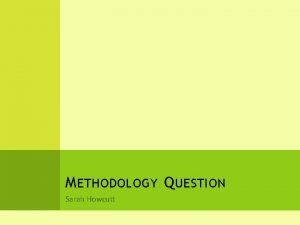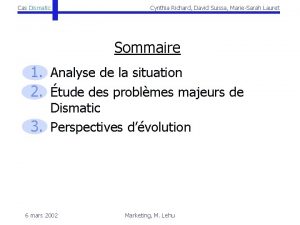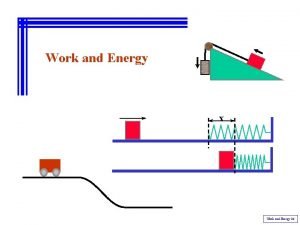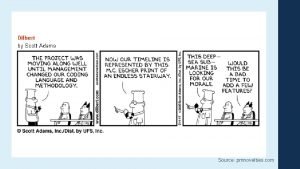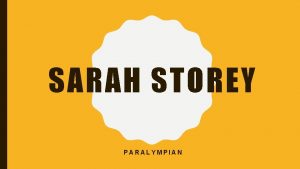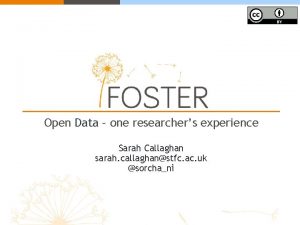M ETHODOLOGY Q UESTION Sarah Howcutt T ODAY















- Slides: 15

M ETHODOLOGY Q UESTION Sarah Howcutt

T ODAY WE WILL ANSWER: What information needs to go into the methodology question for the psychodynamic approach? How can we explain and evaluate Freud’s methods?

W HAT IS METHODOLOGY? A) Another approach to studying psychology. B) A type of experiment. C) The theory about what counts as a useful way of studying the mind and behaviour.

W HAT IS METHODOLOGY? A) Another approach to studying psychology. B) A type of experiment. C) The theory about what counts as a useful way of studying the mind and behaviour.

W HAT STRUCTUREDO WE NEED? Explain Method 1 – linking it clearly to the approach Evaluate strengths of the method (2 minimum) Evaluate Weaknesses of the method (2 minimum) Explain Method 2 – linking it clearly to the approach Evaluate strengths of the method (2 minimum) Evaluate Weaknesses of the method (2 minimum) Use a paragraph for each section to keep you on track and don’t forget to do this for all the methods used.

S TATE THE METHOD OF THE PSYCHODYNAMICAPPROACH. What methods did Freud use to theorise from Dora’s dream? Case study Clinical interview

This is the ‘explain’ bit of the question. C ASE STUDIES Idiographic – focuses on the UNIQUENESS of the individual patient. Study one person in great detail, using a variety of ways of finding out information Eg Clinical Interviews, Free association, Dream analysis Time intensive Any disorders are described before any treatment/therapeutic discussions. Finally there is usually an evaluation of the interpretations and successfulness of therapy.

S TRENGTHS TRUE INSIGHT into the behaviour of an individual compared to “snapshot” lab experiment Why a strength? Eg? QUALITATIVE DATA (views, opinions) are obtained which help us to understand behaviour. More likely to produce valid conclusions if we pend more time. Why a strength? Eg?

W EAKNESSES Can’t GENERALISE findings to other people Why a weakness? Eg? Compared to quantitative data (numbers) QUALITATIVE data can be more easily interpreted in a way that suits the researcher’s theory. Why a weakness? Eg?

W EAKNESSES Freud’s subjects were not REPRESENTATIVE of the populations as a whole. Why a weakness? Eg?

C LINICAL INTERVIEWS They are conducted individually and face-toface in the psychodynamic approach. They have a schedule of questions but the patient can talk freely, with therapist guiding discussion based on the patient’s answers

Clinical Interviews S TRENGTHS Allow for a good relationship to develop, between patient and therapist Why a strength? Eg? The therapist can observe verbal and non-verbal behaviour, eg tone and body-language. Why a strength? Eg?

Clinical Interviews W EAKNESSES Can’t GENERALISE findings to other people Why a weakness? NB different from case studies Eg? Interviewer Bias – the interviewer might have an agenda Why a weakness? Eg?

A N EXAMPLE Examiners love examples – scores on depth and elaboration. Harris and Campbell (1999) Interviewed 128 pregnant women about their pregnancy and what they thought that pregnancy would mean for them. 81% of the unplanned group and 16% of the planned group believed that the pregnancy would be good for them. WHAT DO YOU CONCLUDE FROM THIS?

W OULD IT NOT BE BETTER TO USE AN EXPERIMENT? Some of you have found Freud a bit ‘vague’ and ‘weird’! He gathers QUALITATIVE DATA What are the pros and the cons of this?
 Eaknesses
Eaknesses Ethodology
Ethodology Marie-sarah lauret
Marie-sarah lauret Sarah clarke solicitor
Sarah clarke solicitor Dr sarah woolsey
Dr sarah woolsey Sarah bollinger fairfield university
Sarah bollinger fairfield university Sarah haran
Sarah haran Sarah binti puteh
Sarah binti puteh Mogreps
Mogreps Sarah michaels clark university
Sarah michaels clark university Benjamin banneker inventions
Benjamin banneker inventions Total kinetic energy of a system
Total kinetic energy of a system Dr sarah clements
Dr sarah clements Sarah is selling bracelets and earrings
Sarah is selling bracelets and earrings Beam focusing in ultrasound
Beam focusing in ultrasound The examination of sarah good summary
The examination of sarah good summary
